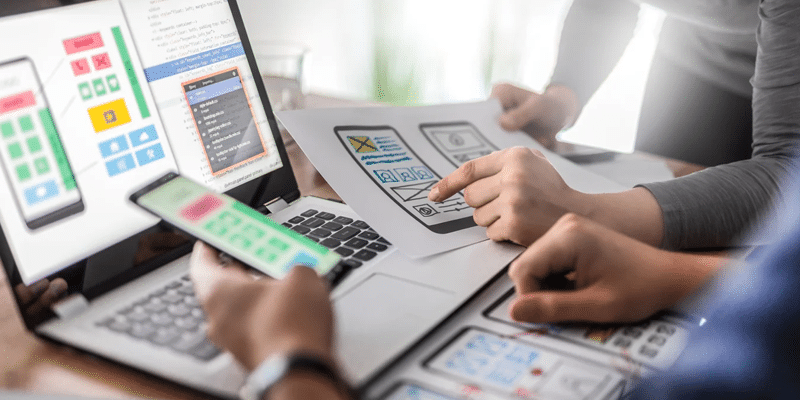An Insightful Short Guide On iPhones Application Development

July 1 , 2021 Posted by Admin
Since the inception of mobile phones, Apple and Google have been the top leaders in the smartphone application development industry. For years, they have sustained their dominance in the mobile app industry and have not let anyone surpass them.
Apple is renowned for its iPhone and iPad smartphone brands. It uses iOS for the iPhone operating system and helps its technological devices function well. It increases the performance and functionality of iPhones and provides ease of compatibility with other business, utility, and gaming apps. Every year, millions of iOS apps are launched in the local market and keep their stay on the top of the Apple Store ranking.
The market value of iPhone apps is expanding throughout the United States and the globe. Mobile app development companies are hiring expert developers to build more and more apps for businesses and individual customers. The demand for iOS development has increased and gives tough competition to its close industry rivals. Many new developers are interested in learning iPhone development and creating fabulous customer apps.
Here is an insightful short guide on iPhone application development service:
Planning an Initial Idea for iPhone App

It is a necessary step to conceive an initial idea for your iPhone app. It allows you to think carefully and brainstorm deeply about what would be the purpose of the app. What your iPhone app will deliver to your audience?
And why would people buy, install, and download your iPhone application? Raise all these questions in your mind and find quick, logical answers to these fundamental business requirements.
Coming up with a Thoughtful Strategy

A strategy is a rough idea for designing an iPhone app. You need to think of a virtual layout of the app’s structure in your mind and sketch your first outline on blank paper. Draw an imaginary draft on a paper sheet and create different sections like a navigation bar, title bar, toolbar, etc. You can also add more functionalities to your iPhone apps such as login and subscription.
Ascertaining the App Audience

The audience is a vital element in building an iPhone application. You need to target your audience first. They are users for whom you are launching your app in the market. Categorize your customers by age, gender, demographic location, industry, profession, income, interest, and preference. These are the necessary factors that you need to look at in your audience and reach them earlier to sell your app.
Designing an iPhone App

Designing and developing an iPhone app is a challenging job for designers. It goes through the process of wireframing, prototyping, and styling. It creates a complete design workflow that includes fonts, images, layouts, and navigation icons. Use a Photoshop or Figma tool to create an advanced level of designs for your app. Make your design responsive and intuitive to fit all devices’ screen sizes.
Developing an iPhone App

Hiring a reputed iPad app development service gives you a detailed procedure of coding, compiling, debugging, testing, running, and executing. You must build a strong technical architecture and select a programming language that supports the front-end (client-side), and back-end (server-side) development platforms.
For the front-end app, you must build a dynamic UI design that works with the application programming interface and supports database storage. You can choose objective C or Swift for the iPhone operating system (iOS). For the back-end platform, you need to create server-side components and functional databases to increase the iPhone app functionality and efficiency. Choose the X-Code for the integrated development environment (IDE) for the Apple Mac operating system.
Quality Assurance Testing

An iPhone app has to undergo various testing phases before getting properly launched in the local and global consumer markets. These testing levels are of utmost necessity for making an app safe and secure.
Make your app free from all bugs and check the speed and performance. Quality assurance testing involves five sub-categories: UX/UI testing, functional testing, performance testing, security testing, and device & platform testing.
Maintenance and Deployment

The maintenance of iPhone apps is an endless process of monitoring the utilization of applications via an analytics platform. You can measure the performance indicator (KPI) to indicate the app’s performance.
Always update your app with the latest version of iOS and added with the newest features and requirements. For the deployment, first, test the iPhone app on the innovative device and then distribute the application to the Apple Store. Share your app to the cloud for the safety and privacy of data. For releasing the app in the market, you need to have a unique app title, concise description, category, and keywords.
Bottom Line
Hence, in a nutshell, these above-mentioned are thoughtful and insightful short guides to elaborate the fundamentals of iPhone application development. It helps you to focus on creating a robust user experience and establishing a cross-platform application development company for your clients.
Also Read: Why Mobile App Development Is A Must In The Era Of Twenty First Century
Services

We at App Development Pros, a renowned mobile app development company, are like superheroes of the smartphone app world! We provide digital opportunities in the mobile app design form and help you turn fantastic ideas into powerful mobile apps for your business needs. Our top-notch app development services build the perfect mobile applications for your needs by working closely with you, making us one of the USA's best mobile app development companies.
2025 (c) App Development Pros - Privacy Policy - All Rights Reserved



































Leave a Reply